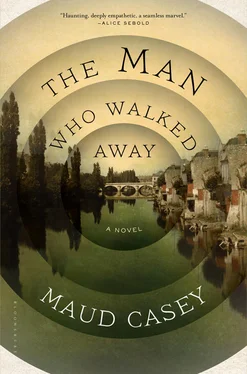The heavy suck of greed pulls at his coat; it tugs at his skin. Please , say the greedy eyes of the high foreheads and the aquiline noses, fixed on the sawdust-covered center of the amphitheater, let there be just a little blood .
He tells himself he is being ridiculous. All of this waiting has made him impatient — was waiting also a part of the lesson they were being shown today? He has greed of his own, after all, pulling from the inside out — where did it expect him to go? He can hardly move a quarter of a centimeter, with men crowded shoulder to shoulder on either side of him and the bony knees of the man sitting behind him digging into the small of his back.
“I was a friend of his son, you know,” says the eager man with the digging knees. There is something medicinal about the eager man’s cologne — like carbolic soap but with a trace of something fishy — or perhaps that is the cologne of the man next to the Doctor. All of the waiting, eager men in the amphitheater have started to blur, one enormous body, ripe and bony. There are the knees of the man sitting behind him again.
“And his house !” Monsieur Eager is saying to — the Doctor can only assume, since he cannot turn around — what must be his eager companion. “Dark alcoves, tattered gothic tapestries, melancholics suffering from syphilis squirming on thirteenth century prayer stools. We — that is, myself and my dear friend, his son — ran around dodging the millionaires from Germany, Russia, America, England, Turkey, who come for prescriptions for strychnine or the thermal cure at Lamalou. .”
Tomorrow there will be a bruise from those digging knees, the Doctor is sure. The ember of irritation that has been burning slowly under his skin becomes a hot flare. He doesn’t want to be marked by the bony knees of this shouting fishy man. In an effort not to melt into the amphitheater of eagerness, the Doctor turns his head as much as possible in order to give Monsieur Eager a look that says, Please, be less eager with your knees .
Monsieur Eager looks directly at the Doctor — is he pressing his knees even more firmly into the Doctor’s back? — as if to say, And what of it ?
A shrill squeal from somewhere beyond the doors of the amphitheater saves the Doctor from wondering why he even bothered. Every eager head in the amphitheater turns.
“It is the great doctor’s South American monkey,” Monsieur Eager says, standing to deliver the news, delighted at the opportunity to educate.
Ahhh , says the amphitheater. A few men nearby laugh knowingly, as if they understood all along. But of course —a smug nodding of heads— the great doctor’s South American monkey! The Doctor has heard the rumors: the monkey in a high chair at the great doctor’s dinner table chewing bananas and stealing food from people’s plates. He puts his jacket back on and takes it off again for the pleasure of digging his elbows one more time into the ribs of the smug nodders on either side of him. He focuses again on the replicas in the center of the sawdust-covered amphitheater, the weight of their possibility. Anything might happen. This is why the Doctor has come.
Anything might happen because this man whose monkey dines at his table has planted a flag for the centuries. He has taken an ancient word and made it new again. Anything might happen during one of these famous unplanned lectures they have all traveled so far to see, in which everything unfolds in the moment, in which everything is yet to be discovered. Anything might happen because they are all here to see the great doctor: this man who not only treats millionaires from Germany, Russia, America, Poland, England, Turkey, but lectures on syphilitic aneurysms, cerebral syphilis with gumma formation, meningitis, progressive optic atrophy, who began the first neurology clinic, and now has six thousand patients in his charge, in what he calls his museum of living pathology.
“Prepare yourself: This is the Versailles of pain,” the aristocratic forehead in front of the Doctor whispers to the aquiline nose beside him. The Doctor hears it: a warning, a promise, and a wish.
“I’ve heard he’s made a diagnosis of an eighteenth century woodcut,” the aquiline nose says, laughing. “Perhaps he’ll diagnose a piece of wood for us. His entire office is painted black, you know. The furniture too.”
The great doctor is so great he inspires the kind of envy that disguises itself as dismissal. But the Doctor hasn’t come all this way to dismiss him. He may not agree with the great doctor’s theory that the volatile emotions of the women he treats suggest a disorder of neurologic origin, an invisible lesion that is evidence of a moral crisis. But he understands the complexity of making visible to others one’s own vision of reality. This is what drew the Doctor into this line of work in the first place; it’s what drew him to the asylum and the philosophy of moral medicine, with its attention to the emotional life of patients, where invisible lesions aren’t the only answer. The patients’ own poignant effort to make visible to others their vision of reality, this nearly impossible translation, is the larger concern around which the Doctor’s life revolves. Why, for example, did Rachel mention The Flying Dutchman and begin to cry for her mother the other day? Why did she stare at her hands for hours on end? Why does she believe a frog lives inside of her? She looks at the Doctor as if she were speaking in intelligible sentences, as if he should know. And then there is Walter, who stops the Doctor in the hallway to ask with great urgency, “Is the woman in the painting my wife?” The Doctor’s life is devoted to understanding these efforts of translation whose source cannot possibly be an invisible lesion, or only an invisible lesion, but an invisible life. Every day, when the sun sets and the hornbeams and the lavender bushes that line the public square outside the Palace of Justice appear to be on fire with the red light, the Doctor thinks of the view Richard must have had as he stepped so casually out of an upper-story window of the asylum. The attendant, George, hadn’t realized what was happening. “That awful, wet thud,” he said before dissolving in tears. George, the largest, hulking attendant they had, who could sling a grown man across his shoulders, suddenly tiny with grief. “They are on fire,” he claims Richard said just before, though how could he be sure? It happened so quickly. What did it matter anyway? All that was left was the jutting bone and the blood crawling stealthily away across the cobblestones as if it, like his family who dropped him off one day and then never returned, wanted nothing to do with him anymore. There had been talk around town after that — the Director is too lax, too permissive, these patients need to be restrained, not coddled. But those who were so critical never seemed to have any answers except returning to the days when mental patients were locked up in chains.
The Doctor may not agree with everything the great doctor is up to, but he has inspired him to deeper thinking about the intimate lives that exist underneath the great doctor’s diagnosis. The intimate, invisible life in addition to the invisible lesion. This is why the Doctor is here. The great doctor has never suggested anything he has not also attempted to demonstrate, so let him make his case.
The great doctor’s monkey squeals again. “That poor beast, locked up somewhere,” says the high forehead sitting in front of the Doctor, a man whose back has been suffering from the Doctor’s own eager knees.
Why is the great doctor not here already, making his case ?
The monkey squeals again and, as if it is his cue, in walks the man himself, the great doctor.
Читать дальше












